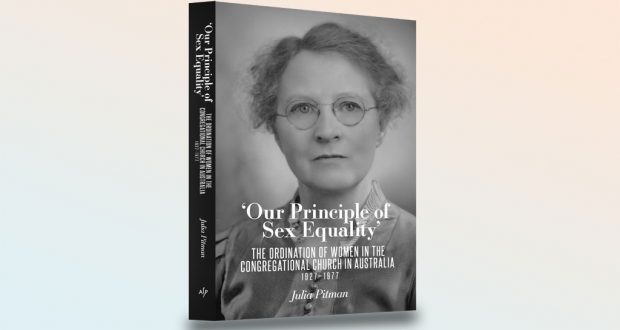Rev Dr Julia Pitman’s new book Our Principle of Sex Equality explores 15 female ministers in the context of the establishment of Congregationalism in Australia. Rev Jim Pearson reviews.
I enthusiastically opened Rev Dr Julia Pitman’s Our Principle of Sex Equality for two reasons. Firstly, as a Presbyterian minister who became a Minister of the Word in the Uniting Church in 2008, I wanted to explore the roots of the deeply held equality the Uniting Church affords women at all levels.
And secondly, my wife is related to one of the 15 pioneering Congregational Church women who were ordained prior to union in 1977. What had the author unearthed about her?
On both points Pitman has delivered. The book traces the history of the ordination of women in the Congregational Church from the earliest days, both overseas and in Australia.
It does so with rigour and thoroughness, and the abundance of references (over 650 footnotes) is testimony to the author’s research and scholarship. Those seeking a book that is polemical and partisan will be disappointed: as Rev Prof Alan Sell notes in the introduction, “There is no hint of the ‘all men are bad’ school of feminism which was in vogue a few decades ago.”
Pitman has made extensive use of primary sources in her research—always a good sign—and has not shirked from documenting the views of those pioneering female ordinands, even when those views are not views we may embrace today.
The book has necessarily focused on Winifred Kiek, the first and perhaps most influential of those 15 Congregational Church women ordained in Australia prior to 1977. She pioneered the way for women, and not just in her own denomination. She and other women with her charted a course into the peace movement, child and maternal welfare, missions, ecumenism and church union. Pitman’s detail about Kiek and those causes was revelatory.
The history of the progression to ordination of women in the Congregational Church and the life stories of the women who were so ordained necessarily overlap.
There were times the book struggled to know if it was biography or history. That said, this is a work that maps a seminal advance in the life of women in an enlightened denomination and hints at the ramifications of that advance for the wider cause of women’s liberation generally. Whether read as history or biography it is a work that has made good a deficit in a field of Australian church history.
As to the question of what the author unearthed about my wife’s relative: I did learn more about my wife’s first cousin once removed, Rev Lillian Hayman. The Pearson (nee Counsell) family tree is now more complete than it was.
Rev Jim Pearson
Rev Jim Pearson is minister with Emerald Uniting Church.
Our Principle of Sex Equality is available at Trinity Theological Library. To purchase a copy visit scholarly.info/book/483
 JourneyOnline
JourneyOnline







